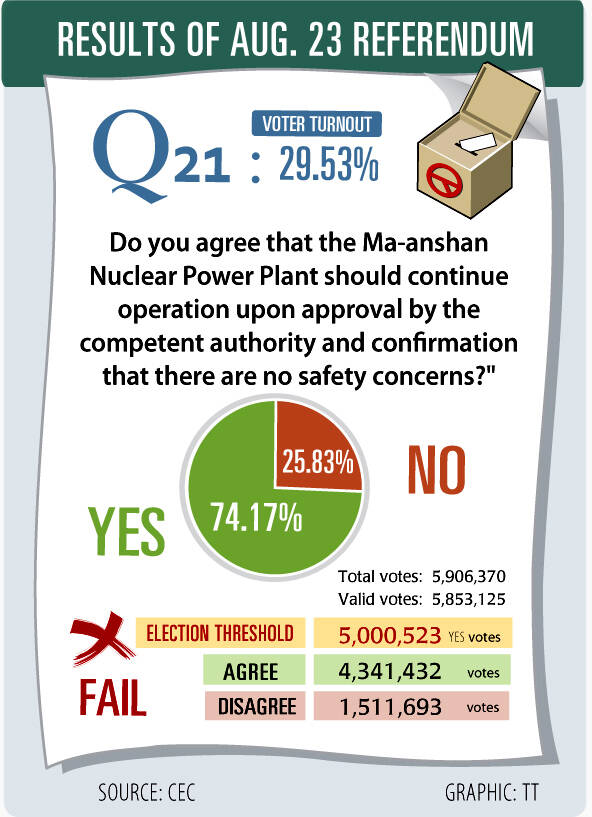Business
Taiwan’s Lai Leaves Door Open for Nuclear Energy Restart

President William Lai stated that the government will not exclude the possibility of restarting nuclear energy generation if specific safety conditions are met. His comments followed a referendum in which more than 4.34 million voters supported the continuation of operations at the Ma-anshan Nuclear Power Plant, while over 1.51 million opposed it. Despite the majority of “yes” votes, the proposal did not pass due to the failure to meet the threshold of over one-fourth of eligible voters, as stipulated in the Referendum Act.
The referendum question posed to voters was whether they agreed that the Ma-anshan Nuclear Power Plant should continue operations upon approval by the relevant authorities and confirmation of safety. The total voter turnout was approximately 29.53 percent, highlighting a significant public interest in the topic, yet not enough to meet the required threshold.
In light of the outcome, Lai affirmed the government’s respect for the referendum result and reiterated the importance of prioritizing nuclear safety in Taiwan’s energy policy. He emphasized that any decision to restart nuclear plants would hinge on the Nuclear Safety Council establishing comprehensive rules for safety reviews. Additionally, Taiwan Power Co. (Taipower) would need to conduct safety inspections in accordance with these guidelines.
Lai requested the Nuclear Safety Council to expedite the formulation of these safety review rules, allowing Taipower to begin inspections once the regulations are in place. He assured the public that any developments regarding safety and potential risks would be communicated transparently.
“If safety requirements are met, the proposal could then be sent to the council for further review,” Lai noted. He outlined three guiding principles for addressing nuclear energy issues: ensuring nuclear safety, managing nuclear waste solutions, and achieving societal consensus.
He acknowledged the potential for advanced nuclear technology, stating, “If nuclear technology becomes safer, with less nuclear waste produced and greater social acceptance, we would not preclude such advanced nuclear technology.” Lai emphasized the government’s responsibility to maintain a stable power supply for the populace.
At a separate press conference, Huang Kuo-chang, Chairman of the Taiwan People’s Party, expressed gratitude to the over 4 million voters who supported the nuclear plant’s restart. He described the referendum result as a pivotal moment in Taiwan’s energy transition, suggesting that the ruling Democratic Progressive Party should reassess its energy policies. Huang pointed out that while the votes did not meet the 25 percent threshold, the overwhelming majority of “yes” votes—nearly threefold against “no” votes—indicated a clear public mandate for change.
Huang urged the Ministry of Economic Affairs to permit Taipower to apply for the restart of nuclear power plants, citing Article 6 of the Nuclear Reactor Facilities Control Act. He highlighted that even in Pingtung County, where the Ma-anshan plant is located, local voters favored restarting the plant to ensure a stable power supply.
In response to the referendum, Chinese Nationalist Party (KMT) Chairman Eric Chu declared the result a victory for public opinion over governmental authority. He called on Lai’s administration to prioritize citizens’ needs over political disputes. Chu proposed five reform initiatives aimed at improving energy security and providing relief packages amid rising US tariffs, further emphasizing the need for governmental accountability and social cohesion.
As this debate continues, the implications for Taiwan’s energy policy remain significant, shaping the nation’s approach to energy security and environmental stewardship in the years to come.
-

 World5 months ago
World5 months agoSouth Korea’s Foreign Minister Cho Hyun to Visit China This Week
-

 Business5 months ago
Business5 months agoStarling Bank Plans Secondary Share Sale, Targeting $5.4 Billion Valuation
-

 Top Stories5 months ago
Top Stories5 months agoMunsang College Celebrates 100 Years with Grand Ceremony
-

 World5 months ago
World5 months agoPAS Aims to Expand Parliamentary Influence in Upcoming Election
-

 Business7 months ago
Business7 months agoKenvue Dismisses CEO Thibaut Mongon as Strategic Review Advances
-

 Lifestyle6 months ago
Lifestyle6 months agoHumanism Camp Engages 250 Youths in Summer Fest 2025
-

 Sports6 months ago
Sports6 months agoDe Minaur Triumphs at Washington Open After Thrilling Comeback
-

 Sports7 months ago
Sports7 months agoTupou and Daugunu Join First Nations Squad for Lions Clash
-

 Top Stories7 months ago
Top Stories7 months agoColombian Senator Miguel Uribe Shows Signs of Recovery After Attack
-

 World7 months ago
World7 months agoASEAN Gears Up for Historic Joint Meeting of Foreign and Economic Ministers
-

 Health6 months ago
Health6 months agoNew Study Challenges Assumptions About Aging and Inflammation
-

 Business7 months ago
Business7 months agoOil Prices Surge Following New EU Sanctions on Russia









